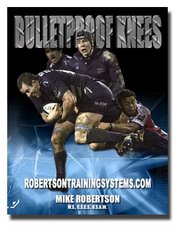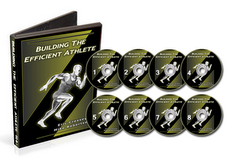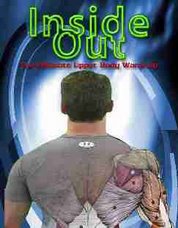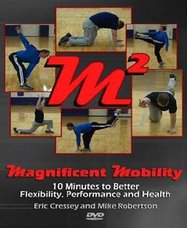I know I used a blog post with this same title in the past, but I think some of the concepts need to be reiterated.
N=1 proves very little. When I say N=1, I'm talking about a sample size of one - this could be you, your cousin Vinny, your sister's boyfriend's aunt, or just about anyone else.
In research, N=1 is a case study. Unfortunately (as we were discussing the other day at I-FAST), a case study can prove damn near anything. And since it's not applied to a larger sample size, the researched modality or method could even be determined to work or not work off the results of the case study alone!
In the real world, the same thing happens. Someone who only coaches one athlete, one client, etc. gets results doing things a certain way and assumes that everyone out there should be doing the same thing. In contrast, when you work with a large number of clients/athletes, all with different backgrounds, goals, injuries, etc., you have a much better perspective on what things work, as well as what doesn't. The goal of programming is always to provide optimal stimulation while attempting to shed away the "fluff."
When applying information to your own training or coaching, do your best to reference the people that are working with (or who have worked with) a wide variety of clients. No two clients are ever the same; two baseball players may have their sport in common, but everything else could be totally different. You should strive to apply the basic biomechanical principles, while simultaneously accounting for their individual tendencies. Doing so will give you the best chance for success, regardless of who it is you're working with.
Stay strong
MR
High Octane Corrective Exercise and Performance Enhancement | www.RobertsonTrainingSystems.com
Friday, October 31, 2008
Thursday, October 30, 2008
The Angry Biomechanist, Part I

Since I've been slacking on the blog this week, I figured I better write something halfway decent today ;)
One thing that's starting to become annoying are the pundits who feel the need to go against the grain, just for the sake of doing so. To be totally frank, if you want to call out a respected expert in the field of biomechanics, you better bring your A+ game to the table. (Please note I am not espousing myself as one, but others who are performing research and writing textbooks themselves.)
Now don't get me wrong here, I'm all for critical thinking - I firmly believe you should not only read textbooks by the experts, but the original studies they cite as well. This is going to take your knowledge and understanding to the next level. Finally, think about how it all comes together - who are they testing? What are the methods? What are the biases of the researchers? Take everything into account.
One topic that is always hotly debated is the idea of spinal rotation, specifically at the lumbar spine. Stuart McGill, Shirley Sahrmann and others have discussed this at length. To summarize, they state how little rotary capacity the lumbar spine has, especially when compared to the thoracic spine.
In an effort to strawman the argument, many will state that if there wasn't supposed to be movement at the lumbar spine it wouldn't be a joint at all! While I see where they're going with the argument, no one said that there shouldn't be ANY rotation at the lumbar spine. However, when you contrast the rotary capacity at the lumbar spine (which typically allows for ~2 degrees of rotation per segment), it pales in comparison to that of the thoracic spine (which allows for 7-9 degrees of rotation at the uppermost segments). In essence, all they're saying is that most people already have maxed out their rotary capacity at the lumbar spine and instead should focus their rotary training on the thoracic spine instead.
To take it a step further, I recently finished reading Bogduk's Clinical Anatomy of the Lumbar Spine. I don't have the exact page in front of me, but Bogduk states that with as little as 3 degrees of rotation at the lumbar spine, you start to see microfailure of the lumbar disc!
Look, everyone is free to believe what they want and to train their clients/athletes in any manner they deem suitable. The bottom line is results - if you get them, then stick with what you're doing. I've seen nothing but positive results since I've focused more of my training (and that of my clients) on getting rotary capacity at the thoracic spine and hips, while stabilizing the lumbar spine.
So until someone proves to me that this thinking is inherently flawed, this is one of those "big rocks" I'll be keeping in my jar.
Stay strong
MR
Labels:
Bogduk,
low back pain,
Mike Robertson,
Shirley Sahrmann,
Stuart McGill
Tuesday, October 28, 2008
Testimonial: Bulletproof Knees
Back in town and back in action next week. For now, here's a testimonial I received the other day.
Mike,
Thanks to your BPK program along with some serious ART, I'm happy to inform you that I've avoided meniscus surgery and my knee is at least 70-80% better! My ART practitioner freed up some of the scar tissue that I had on the front of my knee and behind it, bringing me close to pre-pain levels. While there is still some pain, I'm going to resume my ART treatments in a few months to really hammer away at the remainder of the problem, but in the mean time I will continue foam rolling and mobility work outlined in your BPK manual and M2 DVD.
Seriously Mike - thank you. I thought my dreams of being a competitive athlete were over before they even got started, but now that I'm relatively pain free I'm going to continue pushing towards my goals.
All the best,
Roger Lawson
Mike,
Thanks to your BPK program along with some serious ART, I'm happy to inform you that I've avoided meniscus surgery and my knee is at least 70-80% better! My ART practitioner freed up some of the scar tissue that I had on the front of my knee and behind it, bringing me close to pre-pain levels. While there is still some pain, I'm going to resume my ART treatments in a few months to really hammer away at the remainder of the problem, but in the mean time I will continue foam rolling and mobility work outlined in your BPK manual and M2 DVD.
Seriously Mike - thank you. I thought my dreams of being a competitive athlete were over before they even got started, but now that I'm relatively pain free I'm going to continue pushing towards my goals.
All the best,
Roger Lawson
Labels:
Bullet Proof Knees,
Mike Robertson,
Testimonials
Thursday, October 23, 2008
Old School Article of the Week
In this edition of the Old-School Article of the Week, I've rehashed an article for T-Nation titled "Designer Athletes".
This was written several years ago as an off-season program to help guys transition back into strength work in the off-season. My goal wasn't to include plyos, running, etc.; rather, I just wanted to lay a foundation with strength work before getting into multi-faceted training down the line.
Enjoy!
Designer Athletes
Stay strong
MR
This was written several years ago as an off-season program to help guys transition back into strength work in the off-season. My goal wasn't to include plyos, running, etc.; rather, I just wanted to lay a foundation with strength work before getting into multi-faceted training down the line.
Enjoy!
Designer Athletes
Stay strong
MR
Wednesday, October 22, 2008
Who is this guy?
When looking to get with a potential trainer or coach, this is a great question to ask. Now that we're firmly planted in the Internet age, virtually anyone can proclaim themselves an expert or world-class coach. I'm the first to admit that my status in the industry has been highly elevated due to the fact that I've written for sites like T-nation for quite some time. If I'm actually worthy of that status or not is up to you as a consumer to determine!
So how do you cut through the BS and really determine if someone is good? Here are a few options you can employ:
- If they have a website, thoroughly review it. Do they have articles, blogs, and/or other informational materials that help demonstrate their competence? Keep in mind there's more to sounding smart than bashing others! What techniques do they use to achieve success? What are their philosophies on training/coaching? This will give you a better idea of how they train and if their thoughts/philosophies mesh with your own.
- What is their current status as a trainer/coach? Are they actually training people themselves? Don't be surprised to find out that many internet personalities actually train very few people!
At I-FAST we offer a 14-day trial membership - anyone can come in off the street and get assessed, get an individualized program produced, and train for free to determine if they like the program and us as coaches.
- Finally, and possibly most importantly, ask the other clients/athletes that train with this coach/trainer. Are they delivering results? Do they educate them? Are they achieving their goals? You can talk a big game, but the bottom line is if you deliver to your clients. I'm confident that anyone who works with Bill, myself or any of our future employees will be able to vouch for our competence.
If you're interested in hiring a trainer or coach, doing a little research can go a long way to helping you achieve your goals. Good luck!
Stay strong
MR
So how do you cut through the BS and really determine if someone is good? Here are a few options you can employ:
- If they have a website, thoroughly review it. Do they have articles, blogs, and/or other informational materials that help demonstrate their competence? Keep in mind there's more to sounding smart than bashing others! What techniques do they use to achieve success? What are their philosophies on training/coaching? This will give you a better idea of how they train and if their thoughts/philosophies mesh with your own.
- What is their current status as a trainer/coach? Are they actually training people themselves? Don't be surprised to find out that many internet personalities actually train very few people!
At I-FAST we offer a 14-day trial membership - anyone can come in off the street and get assessed, get an individualized program produced, and train for free to determine if they like the program and us as coaches.
- Finally, and possibly most importantly, ask the other clients/athletes that train with this coach/trainer. Are they delivering results? Do they educate them? Are they achieving their goals? You can talk a big game, but the bottom line is if you deliver to your clients. I'm confident that anyone who works with Bill, myself or any of our future employees will be able to vouch for our competence.
If you're interested in hiring a trainer or coach, doing a little research can go a long way to helping you achieve your goals. Good luck!
Stay strong
MR
Tuesday, October 21, 2008
New Stuff from MR
I've got a ton of programs to write today, so I'm going to keep this brief. Here's some new material from moi that you might not have seen yet.
Bulletproof Your Knees - An Interview with Inga Yandell (located on pages 66 and 67)
This interview is geared toward a more lay population, with an emphasis on women's knee health.
Foundational Fat Loss - Published at FigureAthlete.com
A bare-bones, stripped down fat loss article. Don't expect anything revolutionary, just some of the basic rules and principles that need to be applied to get the ball rolling.
I hope everyone is having a great week. Enjoy!
Stay strong
MR
Bulletproof Your Knees - An Interview with Inga Yandell (located on pages 66 and 67)
This interview is geared toward a more lay population, with an emphasis on women's knee health.
Foundational Fat Loss - Published at FigureAthlete.com
A bare-bones, stripped down fat loss article. Don't expect anything revolutionary, just some of the basic rules and principles that need to be applied to get the ball rolling.
I hope everyone is having a great week. Enjoy!
Stay strong
MR
Monday, October 20, 2008
Q&A: Knee issues
Mike-
I've written you before, but this time I'm nervous and need some advice. I have an MRI scheduled for Monday, and have been told I most likely have a torn meniscus (left knee, medial meniscus) and possibly a partial tear of the ACL.
I know the exact moment I noticed a problem, but there was no trauma or pain to speak of. I was playing a volleyball tournament on 9/28, had played 3 matches and was finishing my dynamic warmup for the 4th match. The only thing I did different was a hamstring stretch with my foot elevated on a wall (slightly above hip height) - kind of dumb and pointless, but in any case...I went to walk onto the court and my left foot was almost being pulled out to the side as I brought it forward in my gait. I was reticent to do hitting lines because I felt like I would collapse after a jump. The feeling subsided and I played the rest of the match, having absolutely no problems. Later that night into the next day, my knee was swollen and stiff.
I finally was able to be seen by the orthopedist last Thursday. He did the test (I forget the name) for the ACL, and found a great deal of laxity in both knees, but the left did not "lock" at the end range of motion. He was surprised that I had never injured or had surgery on my knee - I think he didn't believe me. Of course, I broke my elbow and had a doctor twist it all over the place and tell me it was fine, so I'm not sure what my pain tolerance is.
My questions are two-fold (and I'm going to buy Bulletproof Knees right away, to be sure!!) - any advice on questions to ask the orthopedist about my ACL/meniscus to ensure I'm getting the whole story, and is it possible to forgo ACL surgery (if it's indeed torn) and just work on strengthening the leg? The degree of laxity in both knees (which I think I've had all my life) has opened up the possiblity that my ACL wasn't doing a whole heck of a lot - and the right one still isn't. My main sport is volleyball, playing competitively once a week and a couple tournaments a month, attending nationals and playing beach doubles in the summer.
Any other advice or suggestions you could give me would be much appreciated. If Bulletproof Knees would have most of what I'm looking for, I'll start there.
Thanks for your time - and counsel!
First off, thanks for your question!
When going to your ortho, here are the following questions I would want to know:
- What's the degree of the ACL tear? A full-thickeness tear (Grade 3) would need surgery; anything below (1 or 2) can be treated conservatively in most cases.
- What is the location and size of the meniscus tear? I would then ask you, is there any feeling of locking and/or giving way? Does it cause pain or a decrease in function?
Here are some thoughts, FWIW.
If you don't have a Grade 3 tear, then you'll most likely be able to avoid an ACL reconstruction. That, in and of itself, is good news. I would definitely be taking some time off from volleyball, though, and when you return you may want to wear a brace for a period of time until you're comfortable again with explosive tri-planar movements. As you may remember, this is what Dallas Clark did for the Colts a few years ago - they thought he had torn his ACL, when it fact it wasn't a full-thickness tear. A few weeks of conservative therapy and he was back on the field.
Now I'm all for conservative therapy, but if you DO have a Grade 3 tear surgery is probably your best option. Those that go without a reconstruction are more likely to have rapid onset of osteoarthritis, so even though surgery/rehab would suck, it should give you a better long-term outcome.
What you do with the meniscus tear will then be contigent upon the severity of the ACL tear. If the meniscus tear is asymptomatic and you don't need ACL surgery, you can probably leave it alone - more and more docs are trying to leave these kinds of tears as is. If it is causing you issues though (whether it's pain or mechanical) you may need to get it scoped. I've discussed the difference between partial meniscectomies and meniscus repairs before on the blog, so be sure to check it out here.
I hope that gives you a little ammo when meeting with your ortho this week. Keep in mind that my bias is always to stray away from surgery if at all possible, but in some cases it is warranted and will provide the best outcome.
Good luck and keep me posted!
Stay strong
MR
I've written you before, but this time I'm nervous and need some advice. I have an MRI scheduled for Monday, and have been told I most likely have a torn meniscus (left knee, medial meniscus) and possibly a partial tear of the ACL.
I know the exact moment I noticed a problem, but there was no trauma or pain to speak of. I was playing a volleyball tournament on 9/28, had played 3 matches and was finishing my dynamic warmup for the 4th match. The only thing I did different was a hamstring stretch with my foot elevated on a wall (slightly above hip height) - kind of dumb and pointless, but in any case...I went to walk onto the court and my left foot was almost being pulled out to the side as I brought it forward in my gait. I was reticent to do hitting lines because I felt like I would collapse after a jump. The feeling subsided and I played the rest of the match, having absolutely no problems. Later that night into the next day, my knee was swollen and stiff.
I finally was able to be seen by the orthopedist last Thursday. He did the test (I forget the name) for the ACL, and found a great deal of laxity in both knees, but the left did not "lock" at the end range of motion. He was surprised that I had never injured or had surgery on my knee - I think he didn't believe me. Of course, I broke my elbow and had a doctor twist it all over the place and tell me it was fine, so I'm not sure what my pain tolerance is.
My questions are two-fold (and I'm going to buy Bulletproof Knees right away, to be sure!!) - any advice on questions to ask the orthopedist about my ACL/meniscus to ensure I'm getting the whole story, and is it possible to forgo ACL surgery (if it's indeed torn) and just work on strengthening the leg? The degree of laxity in both knees (which I think I've had all my life) has opened up the possiblity that my ACL wasn't doing a whole heck of a lot - and the right one still isn't. My main sport is volleyball, playing competitively once a week and a couple tournaments a month, attending nationals and playing beach doubles in the summer.
Any other advice or suggestions you could give me would be much appreciated. If Bulletproof Knees would have most of what I'm looking for, I'll start there.
Thanks for your time - and counsel!
First off, thanks for your question!
When going to your ortho, here are the following questions I would want to know:
- What's the degree of the ACL tear? A full-thickeness tear (Grade 3) would need surgery; anything below (1 or 2) can be treated conservatively in most cases.
- What is the location and size of the meniscus tear? I would then ask you, is there any feeling of locking and/or giving way? Does it cause pain or a decrease in function?
Here are some thoughts, FWIW.
If you don't have a Grade 3 tear, then you'll most likely be able to avoid an ACL reconstruction. That, in and of itself, is good news. I would definitely be taking some time off from volleyball, though, and when you return you may want to wear a brace for a period of time until you're comfortable again with explosive tri-planar movements. As you may remember, this is what Dallas Clark did for the Colts a few years ago - they thought he had torn his ACL, when it fact it wasn't a full-thickness tear. A few weeks of conservative therapy and he was back on the field.
Now I'm all for conservative therapy, but if you DO have a Grade 3 tear surgery is probably your best option. Those that go without a reconstruction are more likely to have rapid onset of osteoarthritis, so even though surgery/rehab would suck, it should give you a better long-term outcome.
What you do with the meniscus tear will then be contigent upon the severity of the ACL tear. If the meniscus tear is asymptomatic and you don't need ACL surgery, you can probably leave it alone - more and more docs are trying to leave these kinds of tears as is. If it is causing you issues though (whether it's pain or mechanical) you may need to get it scoped. I've discussed the difference between partial meniscectomies and meniscus repairs before on the blog, so be sure to check it out here.
I hope that gives you a little ammo when meeting with your ortho this week. Keep in mind that my bias is always to stray away from surgery if at all possible, but in some cases it is warranted and will provide the best outcome.
Good luck and keep me posted!
Stay strong
MR
Subscribe to:
Posts (Atom)








